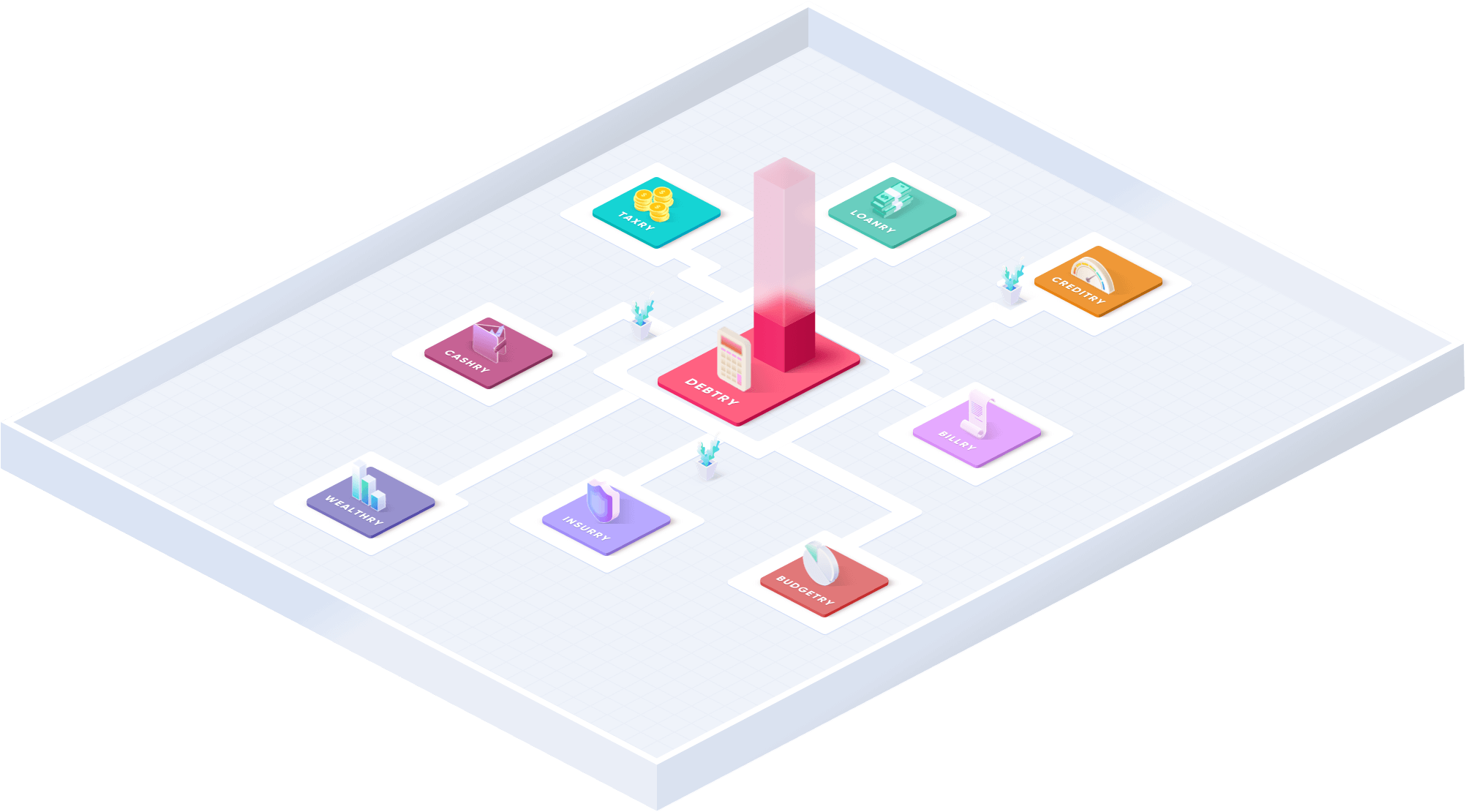Debt Management Plan


It’s almost a fantasy, debt free living. Like gaining superpowers and saving the world or finally getting the fame and admiration we deserve, the idea that we could live without debt calls to us while never seeming quite real.
Debt free living, however, is a reality for many people. People not that much luckier or smarter or better looking than you. For most of us, it may not even be important that we have zero debt of any kind. We just don’t want to always feel so behind, like we’ll never quite catch up again. We want to control our debt so that our debt isn’t controlling us. We need better debt management. We need a workable debt management plan.

The first step in any debt management system or debt management counseling is to make a personal or household budget. This means a detailed list of all income and all spending – your house payment, car payments, utilities, groceries, clothing, entertainment, online orders, subscriptions, gas, movie rentals, gifts, eating out, magazines, downloads, medical, legal, or anything else.
If you’ve never been serious about a budget before, it can take a few hours the first time you sit down and start to clarify just where your money goes each month. After that initial session, it sometimes takes a few weeks or even months to refine the numbers each time you remember something you left out or realize something which should be more accurate. This is where reputable debt management companies will push you to better recognize and understand your patterns and motivations when it comes to spending. Remember – debt management is about money and budgets and goals, but it’s almost always about working through the things which motivate and shape our behavior in the first place.
We don’t have to love that part, but it’s a reality for most of us. So, we embrace it and push forward.
For many people, this is the most emotionally draining part of the process – especially if you’re doing it with a spouse or other loved one. Avoid accusations and reprisals towards yourself or your partner. By simply sitting down and going through the process, you’re acknowledging there’s room for improvement. You’re committing to push forward together. Let the process be a building-up, not a tearing-down.
You can find more specific advice and insight regarding effective and practical budgeting on the Debtry and Budgetry blogs. If you prefer watching to reading, we have numerous straightforward videos on the subject as well. It’s easier than ever to learn from the experts and the experiences of others. Why not take advantage?
If you’ve ever been part of a serious weight reduction program or other fitness regime, you no doubt discovered that there are several layers to changing your eating and exercise habits. One level is about information – learning the right combination of proteins and carbs or the difference between good sugars and bad. Understanding what sorts of workouts are most likely to build muscle vs. shedding pounds. Recognizing useful habits vs. silly trends. The right information is important, and what works isn’t always the same from person to person.
What you no doubt also discovered, however, is that changing personal habits often involves more than passing a quiz or citing some statistics. When we overeat, there’s usually a reason. When we don’t exercise, there are intangible as well as tangible effects. For better or worse, we are complicated creatures and not entirely logical about the most important things in our worlds. We are often motivated by things we don’t always recognize, and changes in our behavior often comes with impacts we don’t expect.
We’re not going to ask you to lay down on the couch and tell us about your relationship with your mother (unless you really want to, I suppose). But we will encourage you to confront and accept whatever’s making debt management difficult for you. We’ll continue to provide not only the most practical debt advice and debt management solutions, but encouragement and support along the way.
Imagine having a close friend who knew all about taking more effective control of personal or small business finances. A friend who believed the best way to pay off debt started with tools for better understanding and managing that debt and connections which would allow you to take the necessary financial steps forward while learning from those who’ve gone before. Imagine being part of the Goalry family while you work out your own debt management program online.
Imagine having your credit cards, car payments, medical bills, checking accounts, credit history, and anything else you needed for effective debt management right at your fingertips. Imagine checking balances, comparing interest rates, or projecting debt reduction with a few clicks or swipes. Imagine a debt management plan adapted to your specific circumstances and priorities and a debt tracker app as easy to use as checking your social media or “clearing the bars” on your fitness tracker.
Imagine access to a growing library of thousands of educational articles about debt management, investing for normal people (that’s you), small business growth, comparing credit card features and the different ways interest is computed, understanding how vehicle financing is changing, explaining the terminology associated with your mortgage or refinancing, exploring options for the most effective household budget, or simply encouraging you by sharing the stories of others from similar situations who’ve discovered just how possible debt free living can be, or how freeing personal debt management can feel.
Imagine easy-to-use tools online or on your phone flexible and powerful enough to adapt to your specific circumstances while streamlined and intuitive enough for you to start using them effectively right away. Imagine a debt repayment calculator that also acts as a debt tracker or debt payoff planner. Knowledge is power, and today’s tech allows us to organize, analyze, and visualize our own data like never before. Besides, it feels good to take ownership of our personal or small business debt management. It turns out you’re better at “adulting” than you realized.
At some point everything else comes down to the income and expenses. The Debtry and Budgetry blogs are filled with articles and anecdotes about shaving down utility bills, reducing monthly costs from subscriptions or other services, eating better on less money, and more. There are big moments we can help you prepare for – buying a home, financing a vehicle, taking out a bill consolidation loan, etc. There are also dozens of little moments each week which collectively add up to increased debt or eventual debt free living.
Every day brings new debt management solutions. Like our health, our mindset, or our relationships, the big things matter, but it’s the little things adding up over time that usually bring about the best or worst results. Once you’ve determined which expenses are essentials, which aren’t technically essential but are still pretty important to you, and which elements of your monthly budget are negotiable, you’ll want to have a strategy for your “get out of debt plan.”
You may be familiar with the “snowball method” promoted by Dave Ramsey. The basic idea is to organize your debts from smallest to largest. Each month, you make the minimum payment on all of your debts except the smallest – on that one, you pay as much as you can afford until it’s paid in full. Repeat the process with your next smallest debt, and so on, until your momentum is focused entirely on your largest – and only – remaining debt.
Other advisors like the “avalanche method.” It’s largely similar, but you start with your debt with the highest interest and prioritize paying it off first. There’s even a “tsunami method” in which you prioritize your expenses from the most to least stressful and start with the bills that freak you out the most. (Talk about owning your emotions when it comes to getting out of debt!)
Choose from these or other methods, but have a practical strategy and stick with it. One thing all experts agree on is the need to marinate your mind in a new way of thinking. Read the free resources at Debtry and across the Goalry family and use other reputable sites as well. Celebrate the power of taking more effective control of your personal or small business finances. Maybe that means you’re not buying as much junk as you used to. Maybe you’re even cutting some things that you’d really have enjoyed along the way. But the knowledge that you’re taking responsibility and building towards a more secure future for yourself and those you love – one with more options than debts? That’s much cooler than one more concert t-shirt, fancy dinner, or other impulse purchase.
You may choose to utilize local debt management counseling services or hire one of the many debt management companies out there. Most reputable services are members of the National Foundation for Credit Counseling (NFCC) and follow strict guidelines regarding customer service and ethical debt management services. Pay attention to any agreement you’re asked to sign, especially if fees are involved. You don’t want to make your financial situation worse by trying to make it better.
These organizations sometimes have leverage with creditors that individuals do not. They can renegotiate payment arrangements or suggest compromises on late fees or other penalties. They’ll also help guide you through some personal financial literacy so you’re better able to avoid similar problems going forward.

There’s nothing wrong with quality debt management counseling. If you’re not sure that’s the best option for your circumstances, you may be able to take many important steps on your own. Start by committing to educate yourself a little bit every week, starting with an article or two a day for the first few weeks. Read Debtry and other blogs across the Goalry family as well as other reputable financial sites. They won’t all agree on every detail, but you’ll start to notice clear patterns and themes and learn what’s most helpful for you.
Of course, all the debt advice in the world won’t reduce your debt until you do something about it. Start trying out the tips for cutting utility costs. Start renegotiating your cell phone, cable, or internet bills. Arm yourself with information before you buy a vehicle, take out a personal loan, or refinance your home. Put that information into action, a little at a time.
Many people have experienced financial problems, including credit card debt. This results in collection offices making insistent calls for you to pay, even threatening to put you in jail, but is this legal?
When you have any amount of debt, it can feel like you have a weight crushing you. The more debt you have, the more critical it becomes for you to be smart when paying it off. There are two ways to prioritize your debt. You can do that by the interest rate or based on how much you owe or the balance for each debt.
Is it better to pay off a debt or settle? This article will look at the advantages of settling a debt and why you might want to consider doing it. This article will also discuss what you can do if you decide to settle or pay your debt. Additionally, it will focus on why paying off debt is the better option.
Going through a bankruptcy is difficult and uncomfortable. Often when you are facing bankruptcy, you are in a financial situation where you do not have a choice. If you are thinking about refinancing, it may be difficult. It will not be impossible, but you should know some details about how to refinance after a bankruptcy. This article gives you all the details you need to make sound decisions.
You can do many things to prevent losing your vehicle and defaulting on your loan. These range from simply phoning the bank or credit union to explain the problem to refinancing the loan. Keep reading to learn about various ways you can prevent a vehicle's repossession.
As you are making payments on your car, you may be wondering how to pay off auto loans faster. Cars depreciate quickly; in most cases, as soon as you drive them off the car lot, they are losing value. This is why it makes sense to pay them off as quickly as possible. Continue reading to find out more about paying off your auto loan.
Have you ever asked, “how to pay off my student loan?” Well, paying off your student loan over five years can save you thousands of dollars in interest. However, it can also free up funds that can be used for other financial obligations and goals such as saving for a home or planning for retirement. Keep reading if you want to learn how to do it.
A bankruptcy case may end in two ways: by completing the repayment plan or by dismissal. The vast majority of cases are successfully concluded through completion of a repayment plan, but for those few cases that cannot be completed successfully, bankruptcy law provides a mechanism to allow an individual debtor to walk away from most of the obligations associated with the bankruptcy. That is called "discharge." The differences between an automatic dismissal and a discharge are outlined below.
Bankruptcy fraud refers to a crime that involves the intentional misrepresentation of financial conditions or assets to obtain money, property, or other benefits from bankruptcy proceedings. It can also involve hiding or omitting information to mislead courts and creditors about the individual's financial status.
One of the more dramatic debt management solutions involves gathering all of your debt together and combining it into a single loan. The idea is that by eliminating multiple creditors and bills every month, you’re able to reduce your monthly obligation and have a better chance of making progress on your debt management plan. Fewer creditors and bills also means less opportunity to forget something or fall behind, which in turn means no more late fees or additional interest. Depending on what you’re currently paying, you may be able to consolidate your debt at a lower overall interest rate, saving you even more over time.
It’s possible to do this on a smaller scale through transferring your balances from several higher interest credit cards to one lower interest card. With a little shopping around, you can usually find some amazingly low rates from credit card providers wanting you to do this, although those promotional rates generally only last for a limited time.
Whatever you choose, realize that debt consolidation doesn’t make your debt go away – it reshapes and reschedules it in order to make it more manageable. It is essential that as you pay off those credit cards or zero out other balances that you do NOT fall into the trap of running them up again while you’re still paying on the consolidation loan. Because you’re consolidating, your credit record will improve dramatically in a very short time and you’ll have credit offers pouring in from every mailbox, email account, or stranger passing you on the street.
Stick to your debt management plan. You can do this!
Whether you eliminate debt in your life entirely, or merely learn how to keep in in its place so that debt is working for you (instead of you working for debt), it won’t be long before you start to realize that debt free living is not the same as living without any fun. Responsible debt management isn’t a gateway to miserly misery or becoming a stingy old curmudgeon. Getting out of debt and learning to manage debt more effectively allows you more access to the things which are truly important to you, often on better terms. It lets you do more over time – not less.
There are many reasons some people seem happier or more successful than others. One of the biggest is that they’ve learned how to live life to the fullest while still doing the hard work of personal debt management.
Debtry is ready to assist with budgeting advice, online tools, and our soon-to-be-released freshly re-imagined debt management app. If you decide that a consolidation loan, better credit cards, or any other investment in your future is the right way to go, we can connect you with reputable online lenders who we think make a good match for your specific situation.
Debt settlement is a great way to take back your life and pay off your debt more quickly and efficiently. However, it’s important to approach this process properly. After all, you don’t want to spend too much or too little money and make it harder on yourself.